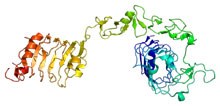
Top stories






More news


Marketing & Media
Ads are coming to AI. Does that really have to be such a bad thing?














By targeting IGF1R, the Cancer Research UK-funded researchers from The Institute of Cancer Research (ICR) were able to kill Wilms' tumour cells in mice. The research is published online in PNAS.
How effective the treatment was depended on the activity of the protein, which sends signals to Wilms' tumour cells - the more active the protein, the more effective the treatment.
Lead researcher Dr Chris Jones, from the ICR, said: "We're very excited that this study has confirmed our earlier work showing that IGF1R could be targeted with drugs to treat Wilms' tumour. We are hopeful we've identified an effective new treatment for this disease, and now need to investigate IGF1R-blocking drugs in children with Wilms' tumour."
The same team previously found that tumours with extra copies of the IGF1R gene are linked to a significantly worse outcome for patients.
IGF1R plays a key role in creating new tumour cells and keeping them alive. The scientists showed that targeting this protein halted the production of new cells, and eventually killed existing cancer cells.
IGF1R-blocking drugs have already been developed and are showing promise in clinical trials for other cancer types, both alone and in combination with chemotherapy drugs. Using Wilms' tumour cells, the team showed that combining IGF1R-blocking drugs with chemotherapy may also work for this disease.
Around 73 children are diagnosed with Wilms' tumour each year in Great Britain. Five-year survival rates have increased from 59 per cent in the early 70s to over 90 per cent today. But if the disease returns survival is substantially lower.
The researchers used sophisticated techniques designed for testing new treatments and understanding cancer. When tumours were grown outside the kidney, they did not look like Wilms' tumours and did not respond to the drug. But, when the cells were grown in the kidneys, the tumour cells looked exactly as they do in patients and responded well to the drug.
Dr Jones added: "This research shows the importance of testing drugs in cells grown in the organ from which the tumour came from to provide the same environment, which is clearly important to their development."
Dr Julie Sharp, senior science information manager at Cancer Research UK, said: "These results suggest that this new drug could be used alongside existing treatments to make them more effective and could allow smaller doses to be given resulting in fewer side effects.
"Cancer Research UK-funded scientists at the ICR played a key role in understanding more about the disease and improving treatments for Wilms' tumours. They discovered important genes involved in the disease and showed that giving chemotherapy before surgery helps spare children from long-term side effects."
Source: Cancer Research UK